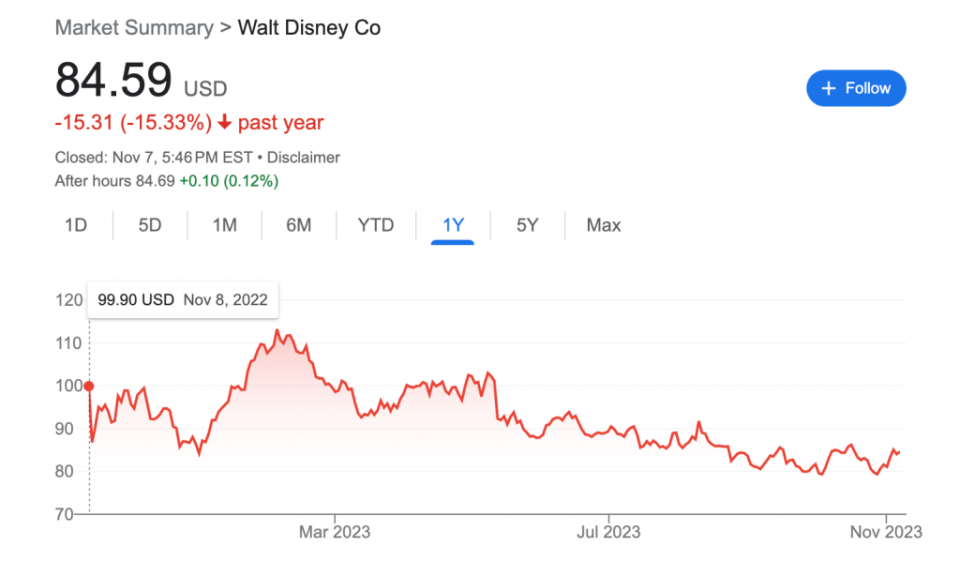Earnings Double-Header: Streaming Profitability to Take Center Stage for Disney, Warner Bros. Discovery
Wednesday will mark a media earnings double-header as Warner Bros. Discovery CEO David Zaslav and Disney CEO Bob Iger present Wall Street with their latest quarterly financials. And the pressure is on to see if the legacy media giants can continue this earnings season’s trend of narrower direct-to-consumer losses and upbeat guidance.
“Based on the success of Netflix, Peacock and Paramount’s earnings, I expect promising results from both Warner Bros. Discovery and Disney,” Omdia media analyst Sarah Henschel told TheWrap. “Entertainment typically also does well during the holiday timeframe so it’s likely that these services will post continued subscriber and/or revenue momentum through the end of the year.”
Both companies face a multitude of challenges, including unprofitable streaming platforms, declining linear businesses, a box office slump and mountains of debt. Disney and Warner Bros. Discovery each have roughly $47 billion in debt. Disney has the added challenges of a stock price that has hit a multi-year low, trying to find a new successor to Iger — who returned in November 2022 following the ouster of his successor-turned-predecessor Bob Chapek — and the return of activist investor Nelson Peltz, who is expected to ask for multiple board seats in an effort to increase accountability.

Analysts surveyed by Zacks Investment Research are expecting WBD to report a loss of 12 cents per share on revenue of $9.94 billion for its third quarter of 2023 and Disney to report earnings 68 cents per share on revenue of $21.32 billion for its fourth quarter of 2023.
Disney’s ‘Action Packed’ and ‘Catalyst Rich’ Q4
Unlike previous quarters, Disney will unveil a new reporting structure, which will break the company’s sports properties out separately from its general entertainment properties. The entertainment giant’s fourth quarter earnings could be “somewhat messy since segment level results won’t be comparable to legacy reporting and most of consensus,” Evercore ISI analyst Vijay Jayant wrote in an Oct. 31 note to clients.
Jayant believes Disney will “modestly underperform” analysts’ consensus estimates for the quarter due to weaker linear advertising, the under-performance of “Indiana Jones and The Dial of Destiny” at the box office, and the impact of its carriage dispute with Charter Communications. The firm anticipates adjusted earnings of 64 cents per share on revenue of $21.4 billion.
Investing.com senior analyst Jesse Cohen expects Disney’s quarterly results to take a hit from “broad weakness in its key streaming and linear TV businesses.” But he also anticipates its sales for the quarter will get a lift due to “relatively strong global performance in its iconic theme parks division.”
“Despite several near-term headwinds, I believe Disney will provide upbeat guidance for the rest of the year as it reaps the benefits of its shift to a more profit-focused company rather than seeking growth,” Cohen told TheWrap.
Even with its near-term challenges, Wells Fargo analyst Steve Cahall views Disney as one of the best-quality companies in the media sector, with an overweight rating and $110 price target. In a Nov. 6 note to clients, he predicted that Disney would to have an “action-packed” and “catalyst-rich” quarter.
Potential positive catalysts for Disney stock include break-even or positive direct to consumer (DTC) operating income and a potential sale of its Star India business. Company executives have said that they expect Disney+ to reach profitability in fiscal year 2024. Meanwhile, negative catalysts to Disney stock include its declining linear business and a lack of clarity on ESPN’s DTC plans.

“We do not expect material net adds for Disney+ core from here,” and net adds could even be modestly negative in some quarters, Cahall said. There’s risk to the market, he said, of digesting a Disney+ outlook that’s less about subscriptions and more about average revenue per user and profits.
When it comes to the company’s guidance, Citigroup analyst Jason Bazinet will be listening for updates on the password sharing crackdown at Disney+ and any potential churn or plan switching related to the entertainment giant’s latest price increase in October. Bazinet, who maintained the firm’s buy rating on Disney stock but lowered its price target from $120 to $110 per share, expects the company to reiterate its target for Disney+ to hit profitability in fiscal year 2024.
Bazinet will also be monitoring the call for any color on strategic alternatives for the company’s linear business and progress on its efforts to turn ESPN into a fully direct-to-consumer offering. In July, Iger told CNBC the company’s linear networks “may not be core” to the company, suggesting he would be willing to potentially offload them to the right buyer. He also said the company was on the hunt for strategic partners that could help with content or distribution for the eventual launch of a fully direct-to-consumer version of ESPN. The company is also reportedly exploring strategic options, including a potential joint venture or sale, for its Star India business, which was acquired in the $71.3 billion purchase of 21st Century Fox’s entertainment assets in 2019.
Additionally, Bazinet will be focused on additional details about Disney’s recent $60 billion investment to expand its theme parks over the next decade.
Warner Bros. Discovery Trims Debt, Boosts DTC Revenue
When it comes to Warner Bros. Discovery, analysts will be expecting news about the company’s efforts to reduce its debt load, while turning its streaming business profitable. The company ended 2022 with $49.5 billion of gross debt and repaid $1.6 billion, or 5%, during the second quarter of 2023.
Cahall, who has an overweight rating on Warner Bros. Discovery with a $20 price target, says the stock is “the name investors want to own because it’s cheap, has strong [free cash flow]and appears open to industry change.”
TD Cowen analyst Doug Creutz, who has an outperform rating on WBD stock and $19 price target, expects WBD to finish the third quarter with 96.8 million direct to consumer subscribers, including 53.5 million domestic and 43.3 million international subscribers, DTC revenue growth of 8% year over year to $2.5 billion and an adjusted EBITA loss of $99 million.
He also anticipates that the company will reiterate its current fiscal year guidance during the company’s earnings call. In an SEC filing in September, WBD anticipated a $300 million to $500 million hit to earnings due to the strike and 2023 adjusted EBITDA of $10.5 billion to $11 billion, down from the company’s $11 billion to $11.5 billion guidance.
“We remain comfortable with our longer-term thesis and believe management has taken the right steps to turn the company around with the full impact of synergies to come in fiscal years 2024 and 2025,” he wrote in an Oct. 13 note to clients.
UBS analyst John Hodulik estimates a decline of 2.5 million subscribers during the quarter, citing “incremental churn from overlapping Max/discovery+ subs and the relatively light content slate.” As of the end of the second quarter of 2023, WBD boasted a total of 95.8 million direct-to-consumer subscribers globally.
Jayant lowered Evercore’s estimate for Warner Bros. Discovery’s third quarter EBITDA from $3.8 billion to $2.8 billion, reflecting “updated intra-quarter guidance” that assumes the SAG-AFTRA strike lasts through the end of the year. However, he raised the firm’s free cash flow estimate from $4.8 billion to $5.5 billion.
Max is not likely to accelerate its subscriber additions until the second half of 2024, due to the Olympics and the platform’s relaunch in Europe, including in new markets France and Belgium, Jayant wrote. The strikes, as well as the delay of Max’s launch in Latin America to 2024, means the platform will not bring on new high-profile content. Also contributing to the content drought is the continued churn of the overlapping Discovery+ and Max subscriber base, the analyst said.
A Potential Earnings Inflection?
Media companies’ direct-to-consumer trends thus far indicate a “potential earnings inflection,” Cahall said in a Nov. 3 note to clients.
“Media has been become almost un-investable for many long-term folks due to the uncertainties/challenges,” he wrote. “If DTC is more stable and profit outlooks improve, that is an equity game changer. It hardly solves every strategic challenge, but it could give the sector new life.”
Last month, Comcast revealed that Peacock trimmed its third quarter of 2023 losses to $565 million, down 8% from $614 million a year ago. Meanwhile, Paramount Global disclosed last week that its DTC division — which includes Paramount+ and the free, ad-supported streaming service Pluto TV — narrowed its losses 31% year over year to $238 million, from $343 million a year ago.
Looking ahead, Paramount anticipates its full-year DTC losses in 2023 will be lower than in 2022, with the division’s losses in the fourth quarter of 2023 running similar to the fourth quarter of 2022. Peacock is expected to hit peak losses of $2.8 billion in 2023, down from previous guidance of $3 billion, and achieve “meaningful EBITDA improvement” in 2024.
While most analysts are expecting Disney and WBD to report narrower streaming losses in line with Paramount+ and Peacock, S&P Global analyst Seth Shafer does not see the upcoming quarter’s results marking an inflection point for streaming. Shafer will be watching for subscriber and ARPU growth as well as “organic improvement” in DTC operating margins.
The major studios, he said, are boosting profits by squeezing their DTC operating losses, but are also benefitting from content production shutdowns related to the Hollywood strikes. “Some of those delayed costs will be shifted to 2024 so I don’t know that it’s ‘mission accomplished’ as far as controlling costs while still scaling their DTC subscriber bases,” Shafer told TheWrap.
Shares of Warner Bros. Discovery are up 21.7% year to date, while Disney is down 4.9% for the same period.
The post Earnings Double-Header: Streaming Profitability to Take Center Stage for Disney, Warner Bros. Discovery appeared first on TheWrap.


